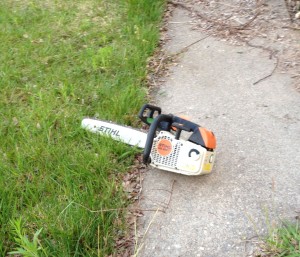









 Emergency Room Sign" />
Emergency Room Sign" />
People often use the word “nuisance” to describe a thing that annoys them. However, it’s important not to confuse the common definition of “nuisance” with the (more complicated) legal claim that shares the name. Annoyances are not legally actionable, but under the right circumstances, homeowners can sue to stop a legal nuisance.
In California, the law defines a “nuisance” as “anything which is injurious to health, …indecent or offensive to the senses, or an obstruction to the free use of property, so as to interfere with the comfortable enjoyment of life or property, or [which] unlawfully obstructs the free passage or use…of any navigable [waterway]…or any public park, square, street, or highway.” (California Civil Code Section 3479)
The law also states that actions taken under the “express authority” of a law (specifically, a statute) cannot be a nuisance.
In plain English: a nuisance is something which is not done pursuant to explicit statutory authority and also: (a) dangerous or causes injury, (b) indecent or offensive, or (c) an unlawful obstruction of private or public property. However, a property owner usually needs to prove more than mere “offensiveness” or “indecency” to recover damages under the law.
The law recognizes two types of legal nuisance claims: Public Nuisance and Private Nuisance.

WHAT IS A PUBLIC NUISANCE?
In California, the Civil Code defines a “public nuisance” as a nuisance (as defined above) which affects “an entire community or neighborhood, or any considerable number of persons” simultaneously. (California Civil Code Section 3480). Not everyone impacted by a public nuisance needs to suffer the same degree or type of consequences. Simultaneous impact is sufficient.
As a general rule, private individuals (including homeowners) cannot sue for damages from a public nuisance, or to ask the court to issue an order stopping it. The exception to this rule occurs when the plaintiff suffered a special injury different from that suffered by the public as a whole. Even then, there are special challenges and obstacles a plaintiff must overcome to prevail on a claim for public nuisance. Consult an attorney promptly if you think you have a claim.

WHAT IS A PRIVATE NUISANCE?
By law, a “private nuisance” is any nuisance which the law does not define as a public nuisance. This judgment involves a legal analysis, and you should consult a lawyer if you think you have a nuisance claim.
In order to bring a private nuisance claim, the plaintiff must have a “possessory interest” in the property impacted by the nuisance or must hold a non-possessory interest in the land (such as an easement) which is negatively impacted by the nuisance. In other words: in order to sue, the plaintiff must be able to demonstrate a legally recognized harm to a property interest (not just an offense to the plaintiff’s sensibilities).
A neighbor who mows the lawn on Saturday afternoons, when neighbors are trying to take a nap, probably isn’t committing an actionable nuisance. Loss of sleep is annoying, but not always damaging to the property rights of those around the irritating noise. In fact, regular yard maintenance, conducted at reasonable hours, probably adds value to neighboring properties rather than damaging them.
By contrast, a neighbor who builds a chicken coop in his front yard and fills the coop with a dozen adult roosters might be committing a nuisance–as well as violating the law in many places. If the roosters lower neighboring property values, and keep the neighborhood awake by crowing through the night, there might be a claim for private–or public–nuisance. However, even this scenario requires a legal analysis based on the facts and circumstances of the situation, and an attorney’s review and analysis would be required in order for neighbors to know for sure whether (or not) they had a claim.
DISCLAIMER: This article is intended for informational purposes only, does not constitute legal advice to any person or entity, and does not create an attorney-client relationship with any person or entity. Trespass, nuisance, and premises liability are complex legal topics, and no single article can provide complete or comprehensive coverage or information about this or any other legal topic or issue. Your personal rights and liabilities may differ, based on individual facts and circumstances. If you believe you have a legal claim or issue, or wish to know more about your individual rights, consult an experienced attorney immediately.

Ross Law, Inc. is located in Santa Monica, CA and serves clients in and around Beverly Hills, Century City, Pacific Palisades, Burbank, Glendale, Toluca Lake, Pasadena, Encino, Tarzana, Playa Del Rey, Torrance, Manhattan Beach, Redondo Beach, El Segundo, Woodland Hills, Wilmington, Harbor City, Carson, Torrance, San Pedro, Long Beach, Gardena, Paramount, Lynwood, Bellflower, South Gate, Los Angeles, Hawaiian Gardens, Artesia, Huntington Park, Cerritos, Bell, Norwalk, Maywood, Santa Fe Springs, Pico Rivera, Whittier, Hacienda Heights, Rowland Heights and Los Angeles County.
© 2015 - 2024 Robert S. Ross. All rights reserved.
Custom WebShop™ law firm website design by NextClient.com.